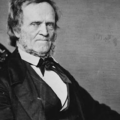You may have heard the phrase, “If you’re not a Liberal at 20, you have no heart; if you’re not a Conservative at 40, you have no brain.”
For many years, this saying reflected the relationship between age and politics in Canada and other Western countries.
Polling by Abacus Data done just before the 2021 federal election showed Conservatives were the least popular with those 18 to 29, and the most popular with those over 60. Meanwhile, combined Liberal, NDP, and Green Party support was highest with younger voters, and lower with older voters.
But fast forward four years, and the script seems to have flipped.
A recent Nanos poll has the Conservatives leading among Canadians 18 to 24 with 43 percent support, and the Liberals leading with Canadians 55 and older with 56 percent support.

Results from the March 30 Nanos Poll. Source: 338Canada. Credit: Janice Nelson
This poll is not an outlier. Other recent polls show similar results. Recent polling from Leger, Liaison Strategy, and Research & Co also shows the Conservatives performing better with younger voters and the Liberals performing better with older voters.
One Leger poll even had the Conservatives in first place among 18 to 34-year-olds in Quebec, historically the least conservative province.
This all begs the question. Why?
The answer is twofold. First, the harsh economic reality facing my generation, Gen Z (people born between 1997 and 2012). Second, a global “vibe shift” in which young people are embracing conservatism as a form of rebellious, counter-cultural expression.
1. The reality for Gen Z today
Today, Gen Z and Baby Boomers are living in different realities.
A recent Abacus Data poll found the top issue for voters aged 18 to 29 is reducing the cost of living, followed by housing affordability, economic growth, and making Canada a better place to live.
Among the issues Gen Z is least concerned about: Donald Trump.
The American president is meanwhile the top issue for those over 60.

According to Leger, 68 percent of young Canadians feel the Canada we’re living in isn’t as promising as the one our parents grew up in.
And the data shows that our feelings are valid.
In 1980, when many Baby Boomers were young adults, the median income was $35,500, in constant 2022 dollars.
According to data from the Canadian Real Estate Association, the average house sold for $67,024 or roughly $232,000 in 2022 dollars. This leads to a house price-to-income ratio (which compares the average price of a home to the median income) of 6.55. One could also rent an apartment for $250 per month (about $870 in 2022 dollars), and a new car cost around $28,000 in 2022 dollars.
Come 2022, the median income was $43,100.
But the average house sold for $703,093, a price-to-income ratio of 16.31. In Toronto and Vancouver, the average house in February 2022 sold for over $1.3 million. The average monthly asking rent on Rentals.ca in February 2022 was $1,820. By the end of 2022, the average new car in Canada was $58,695.
Simply put, wages have not kept up with the inflation of housing prices and some other goods.
And while this trend has been unfolding for some time, it has significantly worsened in the last ten years.
Today, 90 percent of Gen Z Canadians believe owning a home is only for the rich, as it requires an income of more than $200,000 a year in cities like Toronto and Vancouver. More than half of my generation has given up on ever owning a home.
Young Canadians are putting off having families because of the cost-of-living crisis—contributing to Canada’s collapsing fertility rate.
Seventy-eight percent of Canadians aged 18 to 34 feel Canada is “broken,” and many of us believe the Liberals are at fault.

Mark Carney speaks with supporters during his Liberal leader campaign launch in Edmonton, on Thursday January 16, 2025. Jason Franson/The Canadian Press.
Among federal leaders, Pierre Poilievre has been the one talking the most about the issues affecting my generation.
He’s spoken directly to young people stuck living with their parents, promising to improve their lives through more affordable homes, good jobs, and safe streets, and he’s said he wants the restoration of the Canadian promise to be his legacy.
Mark Carney has meanwhile focused much of his campaign on Trump—the top issue for Baby Boomers.
It’s a bet that might end up paying off, given that older Canadians vote at a higher rate than younger Canadians. And because previous Liberal attempts to woo young people have fallen flat.
Boomers are more likely to care about Trump and feel patriotic because Canada kept its promise to them, and they have assets on the line amidst the president’s tariffs and annexation threats.
Almost 75 percent of them own homes. Others also own cottages, a condominium in Florida, and multiple vehicles. They have raised families and have enjoyed stable careers.
Today, many Baby Boomers have the luxury of making Trump their top concern.
Gen Z, on the other hand, is just trying to get by, and many see Poilievre as the best hope for restoring the Canadian promise.

People hold Elbows Up signs during a rally in response to U.S. President Donald Trump’s threats to Canadian sovereignty on Parliament Hill in Ottawa on Sunday, March 9, 2025. Justin Tang/The Canadian Press.
2. The global “vibe shift”
Trends in Canada match what we are seeing worldwide. A growing number of young people are moving away from the political Left and throwing their support behind populist, right-wing parties.
In the last U.S. presidential election, Trump had impressive support among young voters. In Canada, Trump is also viewed more favourably among Gen Z Canadians compared to older Canadians.
In the United Kingdom, Nigel Farage’s Reform UK party is popular with young Britons. In France, the populist Rassemblement National is also popular with young voters. In the recent German elections, the right-wing Alternative for Germany (AfD) was one of the most popular parties among young voters.
Here in Canada, Poilievre’s populist brand of conservatism appears to be resonating with young people.

Pierre Poilievre, centre, poses for photographs with supporters during a meet and greet at the University of British Columbia in Vancouver on Thursday, April 7, 2022. Darryl Dyck/The Canadian Press.
Economic reasons are part of the story, and so is the alienation young people experienced during the pandemic as establishment politicians initiated lockdowns, leading to stunted education and career development and overall distrust in institutions. But there’s also something deeper at play: conservatism is becoming countercultural.
Over the last decade, progressive ideologies have become the guiding force of most major institutions, including in education, media, and entertainment. In many ways, the Left has become the establishment.
And Gen Z is rebelling.
Spectator columnist Kara Kennedy, quoted in a New Statesman article by Pravina Rudra, argues that “when young people grow up, they do whatever they can to rebel. It used to be that these kids would turn punk. Now, after years of ultra-liberalism, to be conservative is to rebel.”
Rudra adds that “modern-day social conservatism has evolved into a response to the extreme liberalisation of Western society through the sexual revolution, the breakdown of traditional family structures, immigration and the decline of religion.”
In the 1960s, counterculture promoted liberal values, in the face of the traditionalism of the past decade. Today, it’s increasingly conservative.
And because Gen Z is living in a digital global village, young people are consuming the same content, whether they’re in the U.S., Canada, or Europe. They are turning to social media and podcasts for news, and to YouTube for entertainment, rather than local or national legacy media or cable tv shows.
And some of the biggest stars in this new digital universe today are conservative.
Joe Rogan, Jake and Logan Paul, Bryce Hall, FaZe Banks, Adin Ross, Patrick Bet-David, Kevin O’Leary—all openly support Trump, some even attended his inauguration. Several rappers, who command huge young audiences, and UFC figures like Dana White have also backed Trump. The immense success of 23-year-old conservative commentator Brett Cooper is another example of the Gen Z conservative wave.
Conservative speakers on university campuses used to get mobbed by protesters. Today, they are mobbed by Gen Z admirers.
Incredible Prove Me Wrong event at CU Boulder today. Massive crowd and massive support for Turning Point and our students. Tons of great conversations and debates.
— Charlie Kirk (@charliekirk11) September 10, 2024
Let's make free speech great again.
Let's go!!
🇺🇸🇺🇸 pic.twitter.com/LPC5AyUjVr
According to American psychologist Jean Twenge, twice as many Gen Z high school seniors in the U.S. identify as “very conservative” compared with Gen X high school seniors in the late 1980s. Today, an increasing number of people my age do not consume alcohol. Some are abstaining from porn and sex. In Canada, Gen Z is most opposed to abortion. Seventy percent of Canadian Gen Z also want stricter immigration controls, and many want private health-care options.
Of course, not all young people are conservative. Many remain on the Left—particularly young women. We’ll also have to see if the polls hold, as other pollsters show Poilievre currently losing young women.
That being said, there has noticeably been a shift.
And this shift has, without a doubt, contributed to Poilievre’s popularity with my generation.
Travel expenses for The Hub’s election coverage are made possible by the Public Policy Forum, the Rideau Hall Foundation’s Covering Canada: Election 2025 Fund, and the Michener Awards Foundation.










